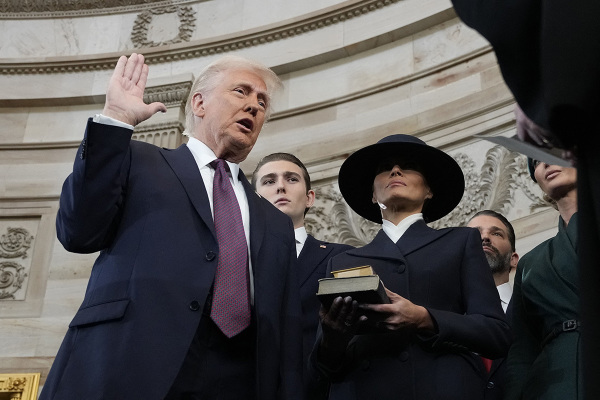Would US Intervention in Syria Be a Just War?
With the United States considering a military strike against the Bashar al-Assad regime in Syria, Christians have an opportunity to apply its "Just War theory" tradition in discerning the appropriateness of the proposed actions. The Christian Post asked three Christian thinkers from across the political spectrum whether military action in Syria would be a Just War.
Though each of them emphasized slightly different aspects of Just War theory, all three concluded that the proposed military response would not be appropriate at this time.
Just war theory was first developed by theologians Thomas Aquinas and St. Augustine. It addresses both when war is justified and how war should be conducted.
Jim Wallis, president and founder of Sojourners, a politically liberal Christian advocacy organization, argued that three important just war theory questions have not been sufficiently answered to justify military action at this time: "have we exhausted all options for peace, do we have a reasonable chance for success, and what would unintended consequences of war be for Syria and her neighbors?"
Wallis also encouraged his fellow Christians to think first about how they can serve those who are suffering as a result of the conflict.
Stephen P. White, a fellow in the Catholic Studies Program at the Ethics and Public Policy Center, a Judeo-Christian advocacy organization, claimed that a strike against Syria could be congruent with Just War theory, but the actions currently being proposed are not. Just War theory says, according to White, that military action is only appropriate when there is a reasonable possibility of success, but the current proposals would leave the Assad regime intact, leave the chemical weapons in place and would not help the rebels win.
"Just War theory was developed, in part, to avoid the trap of consequentialism – the pernicious idea that the ends justify any and all means. The President and his administration appear willing to employ lethal means even if those means aren't likely to accomplish any discernible end," he said.
Mark Tooley, president of the Institute on Religion and Democracy, a conservative Christian advocacy organization, came to a similar conclusion. The proposed actions, Tooley said, are only meant to send a "therapeutic signal," which would only lead to "more conflict and bloodshed," without resolving the situation. Tooley encouraged his fellow Christians to "be modest and admit there are no clear answers. Only God can salvage this situation."
For three more Christian views on applying Just War theory to Syria, check out Jonathan Merritt's article on the topic at Religion News Service.
You can read the full statements from Wallis, White and Tooley below.
Jim Wallis
"With over 100,000 dead in Syria and over two million refugees fleeing the country, I think the question for people of faith to be asking is not if we should respond to the crisis in Syria, but how should we best serve those Jesus called 'the least of these.' As Christians, we need to ask these important questions; have we exhausted all options for peace, do we have a reasonable chance for success, and what would unintended consequences of war be for Syria and her neighbors?"
Stephen White
"Traditionally, Just War theory included punishment for wrongdoing as a legitimate casus belli. It is clear that the Obama administration sees military action in Syria as punitive. As President Obama said in the Rose Garden, 'If we won't enforce accountability in the face of this heinous act, what does it say about our resolve to stand up to others who flout fundamental international rules? To governments who would choose to build nuclear arms? To terrorist who would spread biological weapons? To armies who carry out genocide?' Those are legitimate questions.
"But the President has proposed a response that seems designed to accomplish as little as possible: a 'limited, narrow act,' that involves no boots-on-the-ground, does not target Syrian chemical weapons capacity, is not intended to tip the balance of the civil war, and is not directed toward regime change. One fundamental criterion for a Just War is that there must be a serious prospect of success. It is hard to see how the administration's proposed actions will accomplish what they are intended to accomplish. It is hard to imagine what 'success' even looks like.
"Just War theory was developed, in part, to avoid the trap of consequentialism – the pernicious idea that the ends justify any and all means. The President and his administration appear willing to employ lethal means even if those means aren't likely to accomplish any discernible end."
Mark Tooley
"There are no appealing options in Syria. A brutal dictatorship backed by Shiite jihadists is opposed by an opposition inclusive of Sunni jihadists. United States support for the non-jihadist opposition two years ago may have strengthened their hand. Today there is even more uncertainty. Every path entails more conflict and bloodshed.
"Would U.S. military strikes today qualify under Just War? Not if its intent is only to send a therapeutic signal. Arguably it would if its goal is clearly to defeat the dictatorship and its Iranian/Hezbollah backers while facilitating a new regime that can resist jihadists, creating an approximate tolerance for all of Syria's factions. But lots of needles would have to be threaded to achieve that goal.
"Christians in addressing Syria have to be modest and admit there are no clear answers. Only God can salvage this situation."





















